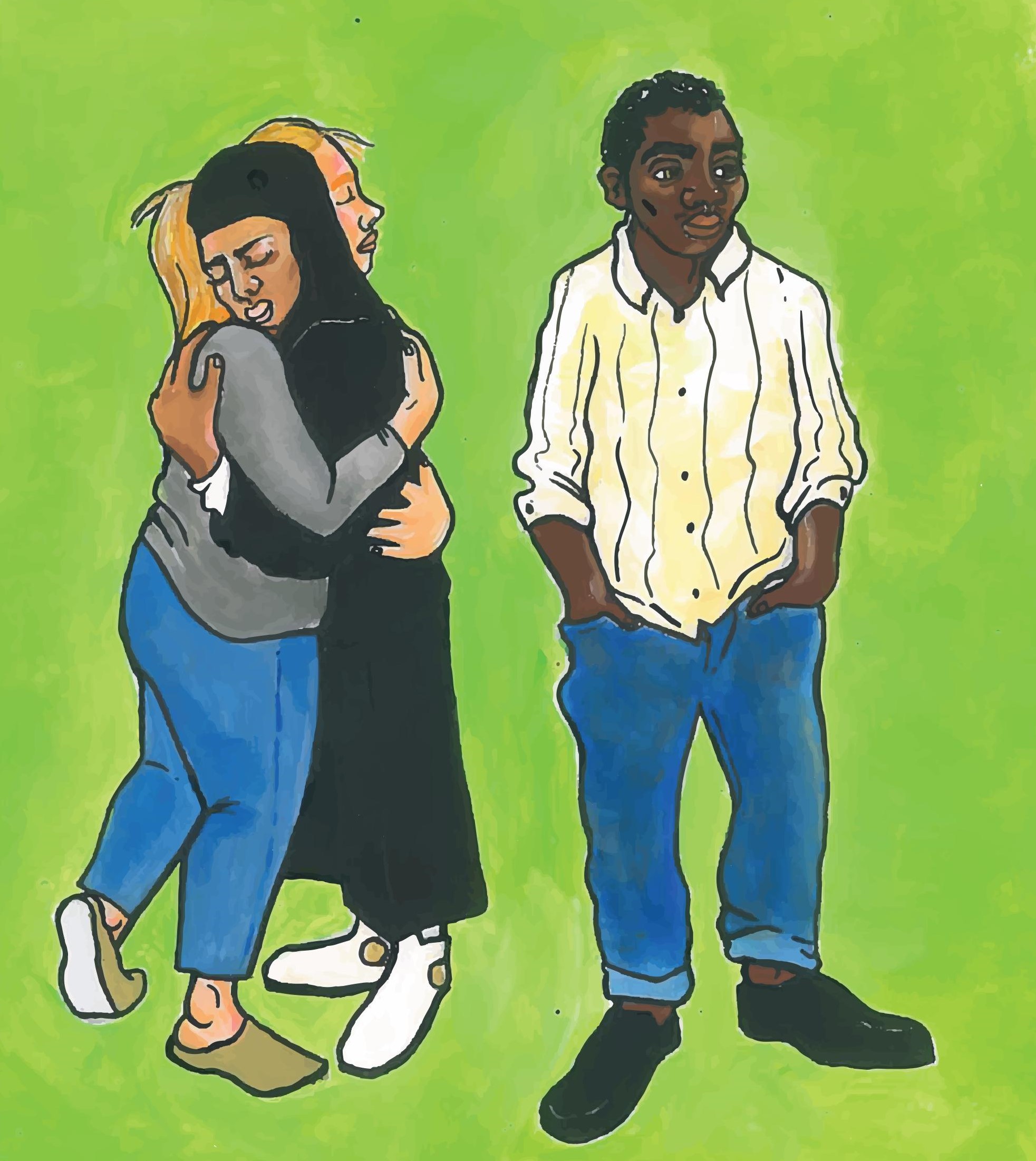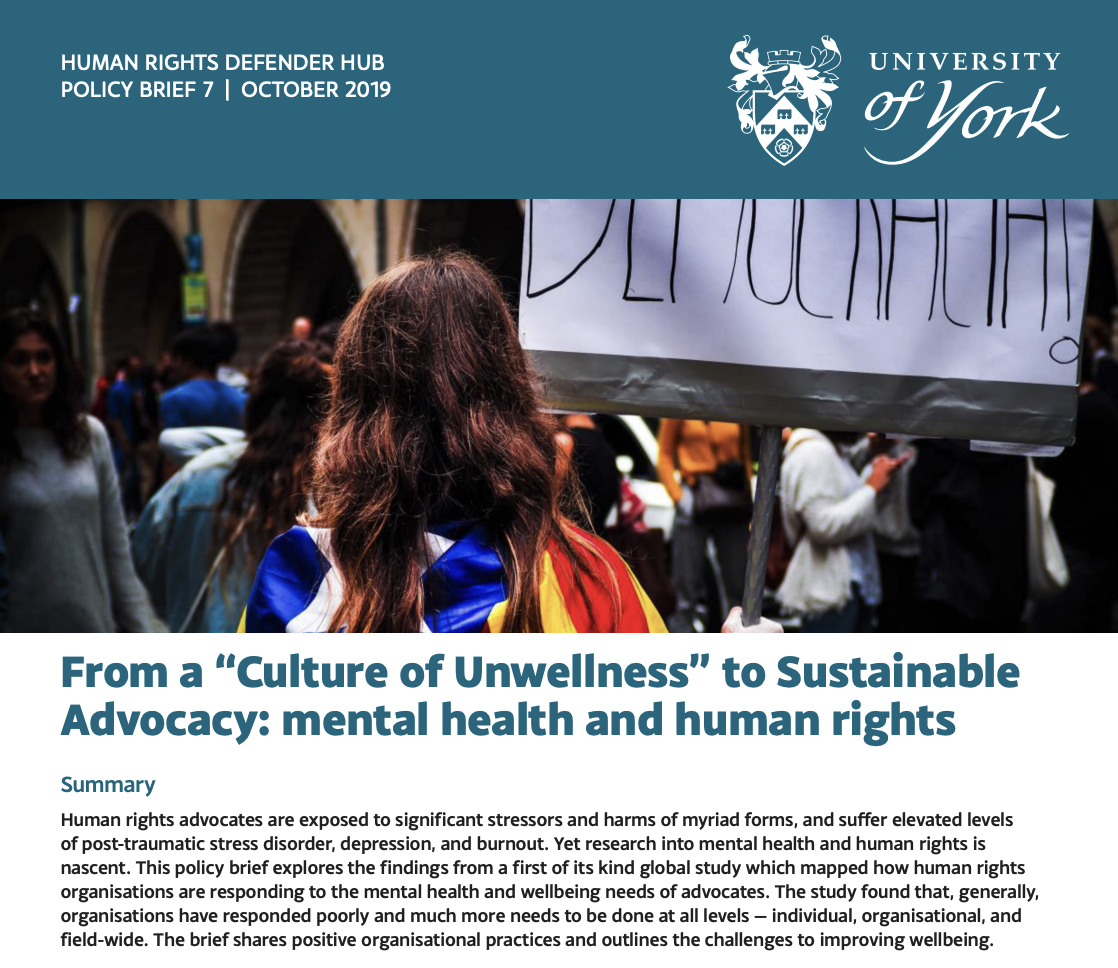The Wellbeing of Human Rights Defenders
The wellbeing of human rights defenders is a critical - but still often neglected - issue in the human rights movement.
In a research project conducted with human rights defenders in Colombia, Mexico, Egypt, Kenya, and Indonesia, 86 percent of 391 respondents to a survey expressed that they were ‘somewhat concerned’ or ‘very concerned’ about their mental and emotional wellbeing.
Artist: Tallulah Lines
Yet, it is difficult to hold conversations about wellbeing with human rights defenders for a number of reasons. Cultures of human rights practice tend to value deep commitment and sacrifice, prompting feelings of guilt in relation to ’self-care’. People involved in human rights work often find it difficult to talk about their own mental and emotional wellbeing; the very language used in relation to this topic can produce resistance. Human rights defenders are also concerned about the stigma around mental health, especially when they are already cast in negative light for their activism.
Human rights defenders can also have very different ways of approaching wellbeing. It is important that we do not presume that certain methods work for everyone and to recognise that experiences of wellbeing are also gendered.
In recognition of the importance of this topic, CAHR has collaborated on a number of research projects to examine ways of understanding the wellbeing of defenders, and to develop resources to help human rights defenders and their supporters promote wellbeing in the global human rights movement.
Project: Temporary International Relocation Initiatives and the Wellbeing of Human Rights Defenders
Artist: Tallulah Lines
In response to the challenges faced by human rights defenders, a range of actors have developed a variety of practices that collectively have become known as “temporary international relocation initiatives” (TIRIs). The unifying feature of TIRIs is that human rights defenders at risk are removed from the country of their danger and relocated temporarily to a place of (relative) safety abroad. Such relocation provides human rights defenders at risk with an opportunity to recuperate, build their capacity, and network with others.
There are at least 50 such TIRIs globally and they are a growing area of programming (and funding) within the human rights movement. Individually and collectively these programmes of relocation have developed expertise and programming in addressing the risks and wellbeing faced by human rights defenders.
This Policy Brief summarises key findings from this project.
Aim of the Project
The aim of this project was to deepen understanding about (a) the norms, beliefs, and practices that hinder as well as support human rights defenders at risk in strengthening their mental and emotional wellbeing, both individually and collectively; (b) how supporters of human rights defenders - in particular, coordinators of relocation initiatives and wellbeing service providers - can assist those at risk in strengthening their mental and emotional wellbeing; (c) which creative and reflective practices strengthen the mental and emotional wellbeing of defenders at risk, and why.
This project involved interviews, surveys, and workshops with human rights defenders at risk on relocation in Europe; interviews with coordinators of relocation initiatives; and interviews with wellbeing service providers (including coaches, therapists, trainers, counsellors, psychologists, psychiatrists, and artists).
Collaborators - This was a research collaboration between CAHR, ICORN, Justice and Peace Netherlands, The Martin Roth Initiative, Adam Brown of The New School in New York, and independent expert on human rights and civil society, Sasha Koulaeva.
The project started in October 2018 and ran until December 2019.
One of key activities of this project was the production of guidelines for coordinators of relocation initiatives and wellbeing service providers on how to support the wellbeing of defenders at risk on relocation initiatives.
The Barcelona Guidelines are based on the research findings from this project and discussions between coordinators, wellbeing service providers, and researchers from around the world at an international retreat in Barcelona in June 2019 (hence the name, The Barcelona Guidelines).
The Guidelines highlight that the wellbeing of defenders needs specific attention, from the very way relocation initiatives are designed, to the activities planned, expectations of defenders, and the resources and funding allocated to the programmes.
The Guidelines highlight that defenders may arrive at their relocation initiatives exhausted and struggling with the mental health issues such as burnout, anxiety, depression, and post-traumatic stress disorder.
The Guidelines also highlight that coordinators of relocation also suffer in terms of their own wellbeing, and that relocation initiatives offer an opportunity for all of us to reflect on our own wellbeing and to model good wellbeing practices with each other.
The Guidelines provide specific guidance on how to handle issues related to wellbeing on relocation initiatives, and we hope that they will be useful to defenders, relocation coordinators, wellbeing service providers, funders, and other protection actors.
The Guidelines are available in English, Spanish, French, German Arabic, and Russian.
Some participants at the Barcelona Retreat, June 2019
ADDITIONAL Resources
This website is a collaborative space run by the Human Rights Resilience Project to bring together resources, research, and tools to improve resilience and well-being within the human rights community. The crucial work undertaken by advocates to investigate abuse and advocate for justice can often expose them to traumatic material, threats, stressors, and violence that can affect well-being. This space aims to meet the urgent need for advocates to have improved access to tailored education, training and research materials.
Their Policy Brief From a “Culture of Unwellness” to Sustainability Advocacy: Mental health and human rights highlights the significance of mental health concerns for the human rights movement and how human rights organisations can do more to support their staff in this area.
Policy Brief: Wellbeing, Risk, and Human Rights Practice
Human rights defenders at risk often find it difficult to talk about their mental and emotional wellbeing, even when they are concerned about it. Cultures of human rights practice tend to emphasize self-sacrifice, heroism, and martyrdom. These norms inhibit defenders from expressing their anxieties and seeking help. How can we engage in discussions about wellbeing in human rights practice? How can we strengthen personal and collective strategies for wellbeing amongst defenders at risk?
Available in English, عربى , Español, Bahasa Indonesia , Kiswahili







